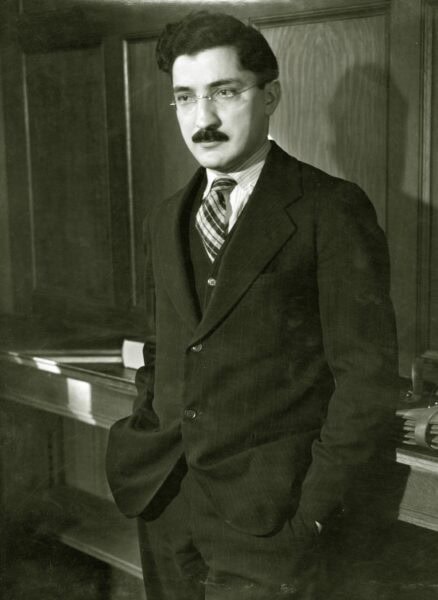A prolific fiction writer, historian, and stalwart advocate of tribal sovereignty and self-determination, William D’Arcy McNickle stands as one of the most important intellectual and political figures of 20th-century Native America.

Photo courtesy D’Arcy McNickle Papers, Newberry Library, Chicago
Born in St. Ignatius, Montana, on the Flathead Nation of the Confederated Salish and Kootenai Tribes on January 18, 1904, McNickle entered a world amid its unmaking. Within months of his birth, the US Congress passed legislation to survey and allot the reservation, with “surplus” lands put up for sale. Non-Indigenous people took possession of the most fertile land, and Flatheads became marginalized and minoritized within their own homeland. McNickle’s mother’s family had been displaced previously. In the 1880s, his Métis grandparents fled the Red River settlement in Manitoba, first for Saskatchewan and then for the Flathead Reservation. His mother, Philomene Parenteau, married William James McNickle, a Scots-Irish laborer. When she petitioned the tribal council to enroll her and her children as citizens, they became entitled to allotments.
Throughout his education, McNickle would have had it conveyed to him that there was no place for unassimilated Indigenous people within this world. He attended a local Jesuit school, an off-reservation boarding school in Salem, Oregon, and public schools in Washington and Montana, before enrolling in 1921 at what is now the University of Montana. In 1924, McNickle sold his allotment to attend the University of Oxford in 1925–26. Unable to finish his degree because of issues with transfer credits, he returned to the United States to work as a car salesman in Philadelphia and in publishing in New York City. Desperate to make ends meet for his family of three during the Great Depression, McNickle secured a position with the Works Progress Administration in 1935 and with the Office of Indian Affairs in 1936. All the while, he pursued his dream of becoming a writer. He published his first novel, The Surrounded, a poignant window on Indigenous struggle and survival in 1936; it has become a key work in the American Indian literary renaissance and has been in print continuously since its 1978 republication.
McNickle’s involvement in Indigenous politics deepened, as did his engagement in community development, education, and capacity building. McNickle was a founding member of the National Congress of American Indians in 1944. In 1952, McNickle left the Bureau of Indian Affairs to become the executive director of American Indian Development. In 1960, McNickle led the drafting of the “Declaration of Indian Purpose,” a statement on federal Indian policy that was formalized at the American Indian Chicago Conference in 1961 and presented to President Kennedy the following year. Such efforts were informed by McNickle’s commitment to combatting tribal termination with an approach modeled on US international development and nation building.
During these years, McNickle continued writing. In addition to numerous popular essays, scholarly articles, and two novels, he published They Came Here First: The Epic of the American Indian in 1949 and The Indian Tribes of the United States in 1962 (expanded into Native American Tribalism: Indian Survivals and Renewals in 1973). He co-authored a historical overview for the American Indian Policy Review Commission in 1977, which pushed for federal Indian policy that prioritized Indian peoples’ desires—a mission that captured the spirit of McNickle’s life’s work and particularly his advocacy for tribal self-determination.
Despite not finishing his BA, McNickle was awarded a Guggenheim Fellowship in 1963 and an honorary doctorate from the University of Colorado in 1966. That same year, he became head of the anthropology department at the University of Saskatchewan, Regina. In 1972, he was appointed the first director of the Newberry Library’s Center for the History of the American Indian. In 1984, it was renamed the D’Arcy McNickle Center for American Indian History and is currently the D’Arcy McNickle Center for American Indian and Indigenous Studies. These name changes speak to the fruits of McNickle’s own labor, and especially his efforts to reshape the field of American Indian history and to cultivate new generations of Indigenous scholars.
D’Arcy McNickle spent his later years in Albuquerque, New Mexico, where he died in 1977. He was an extraordinary man known for his gentleness, and his life and life’s work reimagined and remapped boundaries of Indigenous identity, place, belonging, and home. In both formal and ordinary ways, he insisted on the recognition of the beauty, integrity, durability, and adaptability of Indigenous people, nations, and ways of life.
Daniel M. Cobb
University of North Carolina at Chapel Hill
This work is licensed under a Creative Commons Attribution-NonCommercial-NoDerivatives 4.0 International License. Attribution must provide author name, article title, Perspectives on History, date of publication, and a link to this page. This license applies only to the article, not to text or images used here by permission.